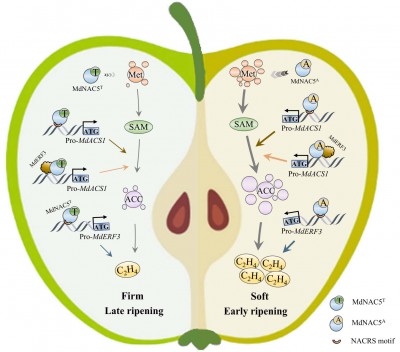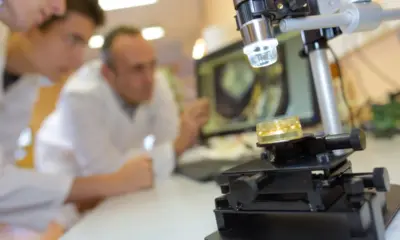Science
Researchers Identify Gene Variant Influencing Apple Firmness

Recent research from the University of California, Davis, has revealed that a single gene variant plays a pivotal role in determining the firmness and ripening of apples. This discovery highlights the genetic factors underlying one of the most important traits for apple quality, which significantly impacts consumer acceptance and postharvest performance.
The study focuses on the transcription factor known as MdNAC5, which has been found to directly influence the differences in firmness among various apple cultivars. Understanding how this gene variant operates could lead to advancements in apple breeding and cultivation practices, ultimately enhancing the quality of apples available to consumers.
Implications for Apple Cultivation
Fruit firmness is crucial not only for consumer preferences but also for the overall marketability of apples. Firmer apples tend to have longer shelf lives and better resistance to bruising during transport. The findings of this research could revolutionize how apple growers select and breed varieties to meet market demands.
According to the lead researcher, Dr. Elizabeth P. McClure, “Identifying the genetic basis of fruit firmness allows us to make more informed decisions in breeding programs, which can enhance both the quality and sustainability of apple production.” This insight provides a valuable tool for breeders aiming to improve apple varieties for commercial success.
The study, published in a prominent agricultural journal in 2023, involved a comprehensive analysis of various apple cultivars. Researchers compared genetic data and fruit firmness measurements to determine the influence of MdNAC5 across these varieties.
Future Directions and Consumer Impact
The implications of this research extend beyond the agricultural community. As consumer preferences continue to evolve, the demand for high-quality and flavorful apples remains a priority. Breeding apples with enhanced firmness could lead to better-quality fruit that meets consumer expectations, potentially increasing sales for growers.
Additionally, understanding the genetic factors influencing apple firmness may lead to innovations in postharvest technology and storage practices. This could further extend the shelf life of apples, reducing waste in the supply chain and benefiting both consumers and retailers alike.
As this research unfolds, it will be crucial for apple producers to stay informed about genetic advancements in fruit cultivation. By leveraging insights from studies like this, the industry can adapt to changing consumer needs while ensuring the sustainability of apple production in the long term.
The work conducted by the University of California, Davis, represents a significant step forward in the agricultural sciences, promising to enhance the quality and availability of apples for global consumers.
-

 Technology4 months ago
Technology4 months agoDiscover the Top 10 Calorie Counting Apps of 2025
-

 Health2 months ago
Health2 months agoBella Hadid Shares Health Update After Treatment for Lyme Disease
-

 Health3 months ago
Health3 months agoErin Bates Shares Recovery Update Following Sepsis Complications
-

 Technology3 weeks ago
Technology3 weeks agoDiscover 2025’s Top GPUs for Exceptional 4K Gaming Performance
-

 Technology2 months ago
Technology2 months agoElectric Moto Influencer Surronster Arrested in Tijuana
-

 Technology4 months ago
Technology4 months agoDiscover How to Reverse Image Search Using ChatGPT Effortlessly
-

 Technology4 months ago
Technology4 months agoMeta Initiates $60B AI Data Center Expansion, Starting in Ohio
-

 Technology4 months ago
Technology4 months agoRecovering a Suspended TikTok Account: A Step-by-Step Guide
-

 Health4 months ago
Health4 months agoTested: Rab Firewall Mountain Jacket Survives Harsh Conditions
-

 Lifestyle4 months ago
Lifestyle4 months agoBelton Family Reunites After Daughter Survives Hill Country Floods
-

 Technology3 months ago
Technology3 months agoUncovering the Top Five Most Challenging Motorcycles to Ride
-

 Technology4 weeks ago
Technology4 weeks agoDiscover the Best Wireless Earbuds for Every Lifestyle




















